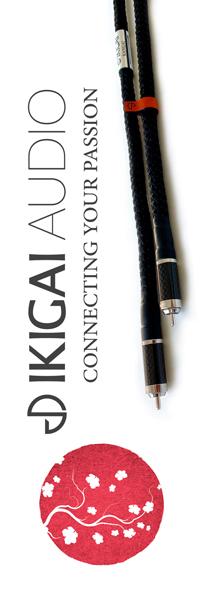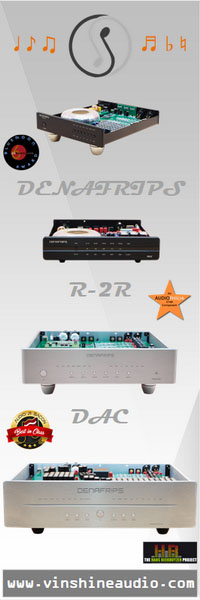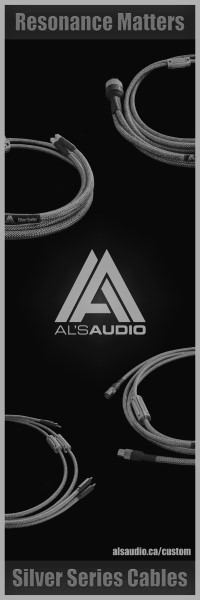One Audiophile’s View
| One Audiophile’s View |
| Commentary |
| Constantine Soo |
| 16 January 2002 |
Sometime ago on its website, Stereophile asked its readers opinions on the ageless debate of choosing between audio accuracy and euphony.
The politically correct answer is nothing other than accuracy, because whether willfully done or not, anything else constitutes a compromise to the goal of faithful reproduction of live performance. To attain the absolute in sonic accuracy from an audio system, not excluding the recreation of the dimensions of a soundstage on which an orchestra performed, we need to have the following prerequisites:
-
A 100% conductive superconductor operable at room temperatures for interconnections;
-
A massless and sizeable transducer system capable of 1:1 instrument image reproduction ratio;
-
A large listening room resembling a concert hall, for housing such speaker system;
-
Electronics possessing tube’s linearity and transistor’s stability.
In addition to the above obstacles, to name just a few, each of us can easily nominate insurmountable blockages to absolute accuracy. Let’s not forget that the recording process itself in its attempt to convert captured air vibrations into electric pulses is an imperfection and removes us from the original experience. Therefore, at the home audio front, absolute accuracy to the live event is unattainable for the all the reasons one can think of. As the pursuit of “absolute accuracy” is the theoretical ideal, relative accuracy becomes our attainable and true goal.
The Way We Are
We are not unaccustomed to hearing some of us proclaiming otherwise “euphonic” sounding system as more musical and at the same time more faithful to the live event than an otherwise accurate-sounding system. “Accuracy” and “euphony” are understandably distinguished by differing priorities among audiophiles.
Essentially different approaches to our hobby, accuracy and euphony represent the extents of our pursuit, as distinguished by degrees of compromise. By pouring tens or even hundreds of thousands of dollars into an audio system, one is often said to be pursuing a “no-compromise” high-end system. In perspective, most equipment priced within reach of ordinary audiophiles is inevitably designed with compromises, with emphasis on certain aspects of sonic parameters. Carefully assembling a realistically priced system can nevertheless yield rewarding listening sessions as each component compensates for the weakness of the other while complimenting the strengths at the same time.
Differing approaches aside, the pursuit of accuracy and euphony plays a pivotal balancing act. Some accuracy-audiophiles among us are in a respectably different mind set than the rest of us. Oftentimes taking the hobby to the extreme, these accuracy-audiophiles attempt to zero-in on sonic reproductions of live events, often at formidable cost. This is the thrust contributing to audio science advancements.
To most of us, the harsh reality of economics demands compromise in our quest for maximum accuracy by minimizing the impact of distortions and mismatches within our systems. The resultant compromised sound does not always equate with a dissatisfying experience. In fact, with the possible exception of a small number of us who strictly pursue high-end audio for its own sake, we still find the musical experiences stemming from the hobby itself endlessly enticing, and the fruits of our labor enormously satisfying in the recreation of music.
The capabilities of an audio system in its reproduction of sonic criteria like dynamics, frequency extension, imaging, soundstaging, timbral realism and so forth, are the bare necessities needed to reconstitute a realistic listening experience. Understandably, most of us within the dimensions of our listening room and the depth of our pockets can only afford to recreate some criteria over the others. To some audiophiles, the calculated adoption of audio euphony accomplishes the objective of a relatively truthful rendition of the actual musical event by masking the distorted portion of an instrument’s sound with a softening of certain frequencies, for example.
It is fair to state that the memory of a live event imparts such a haunting effect on us that, to a certain degree, we strive to harness the means to re-live the impact of that event, either by a virtual recreation of its tonalities, its dimensionality, or even the dynamics of the event. That’s why we are in this hobby. Although we hold live performances in the highest regard against which all audio systems are to be judged, we don’t want real players to invade our living rooms. We could have diverted the jaw-dropping amount of money many of us poured into this hobby to the hiring of musicians to come into our own homes and perform. However, that is missing the point of being an audiophile.
Being an Audiophile
We audiophiles are like practitioners of magic, concocting in our own ways the elusive moment of magic, commencing with the first note generated by our high-end audio system. The excitement that new equipment can bring us the moment it arrives at our doorstep is precious. And whether you like it or not, after meticulous unpacking and setting up, the music that fills the room is the sound of magic, because there are always those of us who are aspiring to another fellow audiophile’s level of sonic refinement.
Being an audiophile means adopting a lifelong pursuit of musical experience and enlightenment, via the art of home audio. Attending a concert holds renewed excitement and intensity. Among a concert audience, he/she is distinguished by his acute consciousness over the rest of the audience of the unfolding event’s dimensionality and of all its sonic glory. And while the majority of the audience will go home and simply look forward to the next concert, this audiophile’s adventure has given new sense of purpose and is never-ending, as there is a magnificent ensemble of high-end audio equipment standing by for the audiophile to come home to.
In a family gathering, an audiophile is the stellar member who is known for aspiring to more exotic standards in life by his critical opinion of reproduced sound. Among his friends, an audiophile is a hermit and a nut. To his wife, an audiophile is the man who can justify buying impractical and expensive toys, because they keep him home.
An audiophile is a creature of curiosity. Being an audiophile means taking a tireless attitude towards knobs and switches and configuration experimentation, as well as taking extended listening sessions at home, and critically examining the merits of a particular design before laying down the long green. This hobby sometimes requires ample amounts of brainpower and patience in the gathering of review opinions and product information, not to mention the processing and organizing of all that information in a manner that will yield maximum returns.
As in the sports world, where we admire athletes possessing superior mental discipline and physical coordination, we in the audio world admire engineers with the ingenuity and vision to pioneer new circuitry designs and other breakthroughs. Furthermore, in my humble opinion, our hobby is being taken to new heights by the recently renewed aesthetic awareness of many manufacturers, whose equipment’s stunning looks are making increasingly stronger artistic statements.
With all that has been said, we audiophiles can never resist finding out what other fellow audiophiles are doing with their systems. Some consider it part of the fun; some find the process laborious. Quite possibly, others may consider what I value to be the most important aspect in the playback chain to be secondary, or even lower on their list of priorities.
For example, one audiophile/reviewer I visited was using a pair of renowned speakers with an MSRP of around $15,000. Yet to my standards, I found his sources to be wanting. Nonetheless, he had one of the most elaborate arrangements of cables I’d run across, using precut Styrofoam to set cables apart, so no two cables would touch each other. Furthermore, long runs of speaker cables were elevated on wood blocks to ensure tensionless suspension and to lift them from interaction with the flooring. Imagine his dismay, and perhaps even disgust, had he seen how all my cables were laid around where they fell!
Like it or not, with much effort and time spent on your own audio system, you will eventually personalized it to exhibit a sonic priority that is exclusively your own and no one else’s. In contrast, buying an entire system from your dealer will get you the sound your dealer created, provided your room acoustics are identical. Contrary to what you think the “absolute sound” should be, it exists only as an ideal and not in the real world.
It means you determine if your system sounds right, you determine if the next step should be an experiment with transistors versus tubes, you determine if electrostatics are your cup of tea – over horns, cones or planar magnetics. All that honestly matters is that in the end you are happy with what you have achieved; that your standards have been met, and that you are not bothered at all by other’s comments. If you are happy with your system, yet at the same time find yourself in agreement with your fellow audiophiles’ differing opinion, those views should be considered with a balance of curiosity and reservation, not with shock and depression.
The Hobby
Are we in this hobby simply for the recreation of a live event in our homes? The complexity of our hobby can be likened to an instance where you choose a restaurant not solely based on how much you like the food, but on balance of your appreciation of how good the food tastes, the menu pricing and the atmosphere in which you dine. Yet other aspects of this restaurant may well come into play: friendliness of waiters and waitresses, interior decors, location or its reputation.
Audio is as multi-facet a hobby as any other and will carry different meanings to different people. While enticing sound recreation is the purpose for the existence of all audio equipment, they sometimes are like objects of art or obsessions that can quietly take on different meanings and purposes. Don’t sneeze at those who collect a variety of equipment from the most expensive and exotic to whatever interests him, or that audiophile at the other end of the spectrum who changes his system every month. It is ok as long as they can afford to do so. We may envy those among us who possess the financial freedom in acquiring astronomically priced gear, and pull out our hair in the face of knowing that their system could sound a whole lot better had they been equally diligent in acquiring some fundamental audio knowledge. Still, we shouldn’t be overly critical of others. Every audiophile takes his/her approach to sound reproduction very seriously with the investment of both money and time, although the soundness of the individual’s approach can sometimes be debated. In addition, everyone deserves a chance to learn, unless of course that person is your spouse.
The pursuit of better sound in our hobby is certainly an endless one, and thank goodness for that; but if you constantly compare your system to others’ for better sound, you may lose sight of what you accomplished and be prompted to make hasty changes. Soon, you could find this hobby much less rewarding than it could’ve been.
I do believe that all of us tend to go in natural cycles, pursing one kind of sound for sometime before trying something else. That’s part of the fun until you get really serious and extreme. In that regard, we just need to cherish what we have and be open-minded about others’ experiences.
Audio is an expensive, as well as spiritual and materialistic, hobby, and in its pursuit, let us hope that we are becoming better persons and living longer. Amen.
![]()
Don’t forget to bookmark us! (CTRL-D)
Stereo Times Masthead
Publisher/Founder
Clement Perry
Editor
Dave Thomas
Senior Editors
Frank Alles, Mike Girardi, Key Kim, Russell Lichter, Terry London, Moreno Mitchell, Paul Szabady, Bill Wells, Mike Wright, Stephen Yan, and Rob Dockery
Current Contributors
David Abramson, Tim Barrall, Dave Allison, Ron Cook, Lewis Dardick, Dan Secula, Don Shaulis, Greg Simmons, Eric Teh, Greg Voth, Richard Willie, Ed Van Winkle, and Rob Dockery
Music Reviewers:
Carlos Sanchez, John Jonczyk, John Sprung and Russell Lichter
Site Management Clement Perry
Ad Designer: Martin Perry





Be the first to comment on: One Audiophile’s View